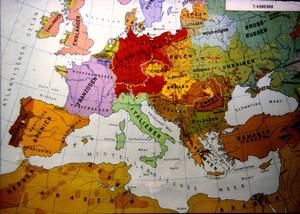ExtremismEuropean ethno-nationalist and white supremacist movements thrive
More than seventy years after the defeat of Nazi Germany, ethno-nationalist and white supremacist movements in Europe continue to thrive. They include far-right political parties, neo-Nazi movements, and apolitical protest groups. Some groups openly espouse violent white supremacy, while others have propagated their radical stances under the guise of populism. Though not all of these groups directly link their ideologies to Nazism, their propaganda portrays immigrants and ethnic minorities in a similar manner to how Nazi propaganda portrayed Jews, blaming them for national economic troubles and depicting them as a serious threat to the broader national identity.

Ethnic distribution as of 1914 // Source: commons.wikimedia.org
More than seventy years after the defeat of Nazi Germany, ethno-nationalist and white supremacist movements in Europe continue to thrive. They include far-right political parties, neo-Nazi movements, and apolitical protest groups. Some groups openly espouse violent white supremacy, while others have propagated their radical stances under the guise of populism. Such populist groups claim that they are striving to protect average hardworking Europeans by preserving their livelihoods and heritages from economic and cultural threats posed by immigrants and ethnic minorities.
In a new report from the Counter Extremism Project (CEP), the authors argue that though not all of these groups directly link their ideologies to Nazism, their propaganda portrays immigrants and ethnic minorities in a similar manner to how Nazi propaganda portrayed Jews, blaming them for national economic troubles and depicting them as a serious threat to the broader national identity.
From the report’s executive summary:
In a June 2018 speech, German Chancellor Angela Merkel recognized that the majority of refugees are victims, and that “escape and expulsion are part of our German and European history.”1 Nonetheless, several far-right political parties in Europe have infused anti-immigrant and particularly anti-Muslim xenophobia into their party platforms through the concept of ethno-nationalism––the idea that a nation should be composed of a single ethnicity. These parties postulate that hardworking European natives are suffering economic and cultural losses due to immigrants and ethnic minorities who want to replace national, religious, and cultural identities with foreign values. Ethno-nationalists also view multiculturalism as a code word for the destruction of the native national identity. For example, Hungary’s neo-fascist Jobbik political party rejects “the dead-end Western European multiculturalism” and has pledged to “defend our cultural identity developed over our history.”2 Groups like Germany’s Alternative für 2Deutschland (AfD) political party lament the influx of Muslim immigrants, which they claim weakens the German culture and quality of life. AfD has gone so far as to claim that Islam is a danger to Germany.3
